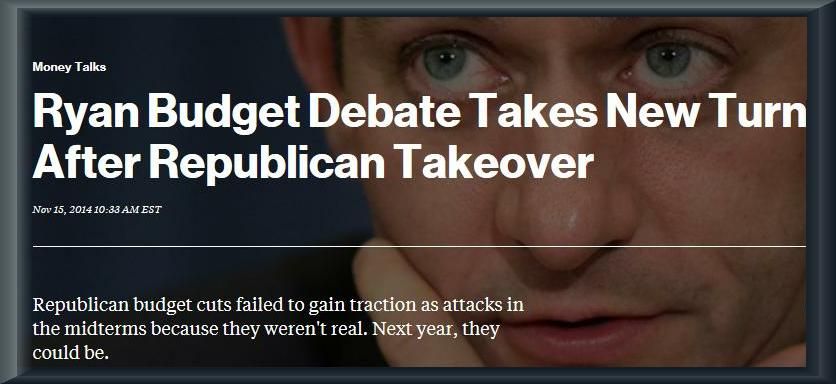It Looks Like Paul Ryan Has Won After All!
It Looks Like Paul Ryan Has Won After All!

Thanks to all those liberal Democrats who stayed home on November 4th... This is what you did for the American 99%.
"The Ryan budget." Them's fightin' words. Democrats have long railed against the Republican blueprint by Mitt Romney's 2012 running mate, but they never really had to worry about stopping it. They may have to take it a little more seriously, now that Republicans have won control of the U.S. Senate and still hold the House. But if they play their cards better than they did in this year's midterm elections, this may just give them a renewed line of attack for 2016.
The House keeps passing Ryan budgets each year but so long as Democrats controlled the Senate, the proposals never really stood a chance of implementation, or debate, or even headline-grabbing veto threats. The last version of the plan by Budget Committee Chairman Paul Ryan of Wisconsin passed in April. It advocated about $5 trillion in federal spending cuts over a decade by revamping and constraining the growth of Medicare, and cutting healthcare, food stamps, education and farm spending. While Americans like concepts such as fiscal responsibility, polls since 2012 suggested there could be a backlash to aspects of Ryan's plans, especially to fiddling with Medicare.
Representative Chris Van Hollen of Maryland, the top Democrat on the House Budget Committee, said in an interview Friday that when budget season rolls around early next year, "it's kind of hard for Republicans in Congress to turn to their voters and say, 'You know that Ryan Republican budget we always pushed for? We weren't really serious.' So I think there will be tremendous pressure for Republicans to pass a virtually identical version, and with Republicans in control of the Senate it's hard to see how they duck that issue. Bottom line is, they're now firing with real budget bullets and I do believe their budget does great harm to lots of people in this country. It's going to be a wake-up call to the public."
Some of the key areas of partisan contention in any upcoming budget debate:
Medicare
Ryan's plan shifted Medicare, which provides health services to seniors, to a premium support model. It assumed the creation of an insurance exchange in 2024 where seniors could purchase insurance. Those who enrolled in the Medicare program before 2024 would have entered the existing fee-for-service model. Under that new system, seniors would choose between purchasing a private plan through the exchange or traditional fee-for-service Medicare. Seniors would receive subsidies to offset the cost of purchasing private coverage through the exchange. The plan would also institute means testing within Medicare programs, whereby wealthier seniors would receive a lower subsidy amount and low-income seniors would receive more. Insurers offering coverage through the Medicare exchange would have to offer insurance to all beneficiaries choosing to enroll in a private plan. The plan also assumes that the retirement age for Medicare would be increased to match the current Social Security retirement age of 67. Democrats have used the proposal in recent campaigns to accuse Republicans of undermining a promise to America's seniors and especially hurting those of modest means.
Medicaid







<< Home